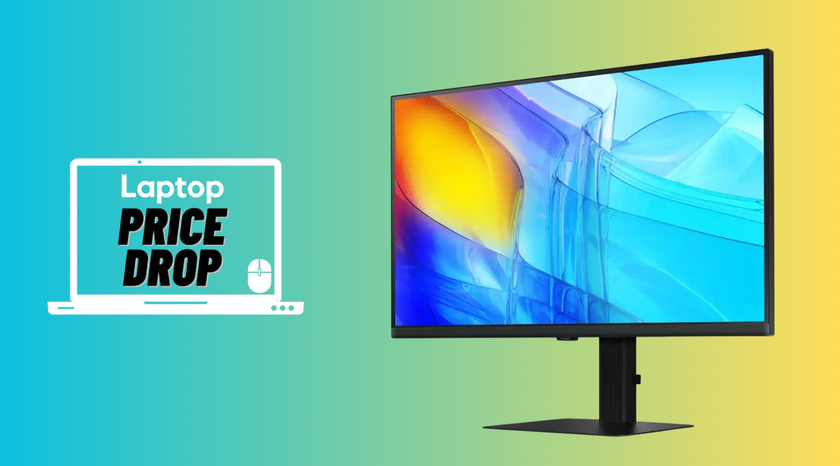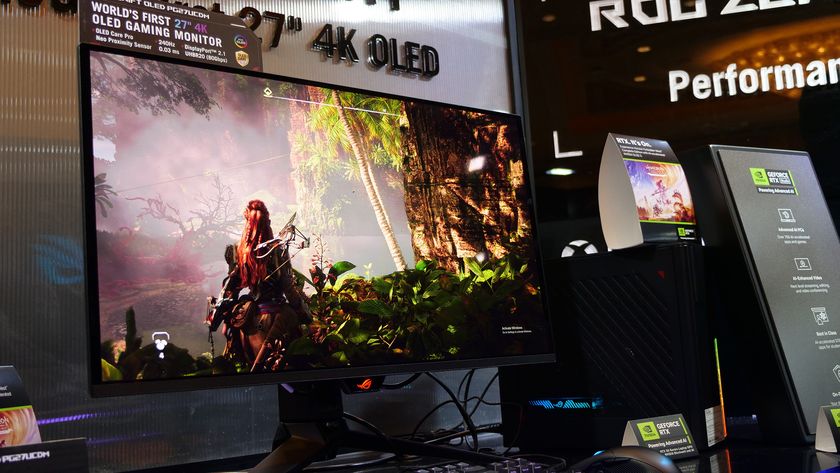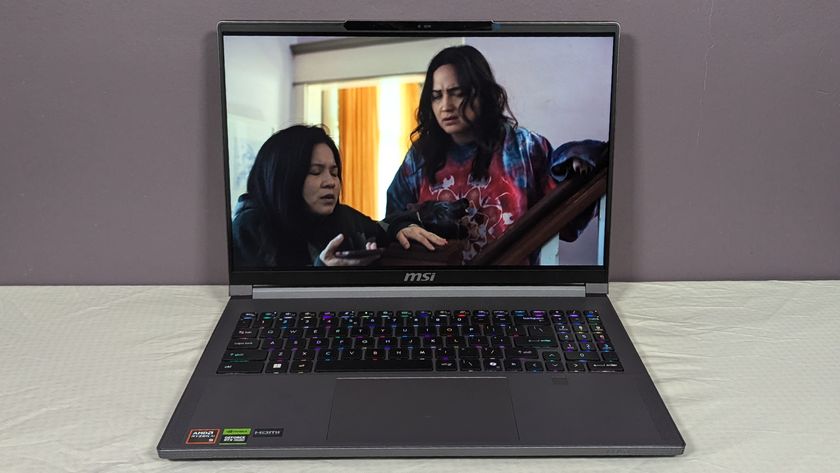The best gaming monitors in 2025
We've used and tested them all: These are the best gaming monitors for 1080p and 4K gaming.
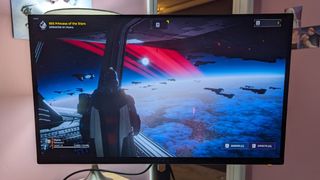
1. The list in brief
2. Best overall
3. Best budget
4. Best 360Hz
5. How to choose a gaming monitor
6: How we test
The best gaming monitors transport us to another world.
And whether you're rocking an affordable or high-end gaming setup, you'll need something satisfying. Gaming monitors come in all shapes and sizes, and they're really useful for providing more display real estate for games and freeing up your laptop screen for guides or Twitch chats.
However, you should know a few things before buying one of the best gaming monitors. You'll have to choose between 4K, which gives you sharper images but lower refresh rates, and 1080p, which favors responsiveness over resolution—everything in between lands in the middle of the spectrum. High Dynamic Range (HDR) also nets you better color and brightness but at a higher cost.
You'll also have to choose a panel type: IPS (in-plane switching) and OLED (organic light-emitting diode). The former is cheaper, while the latter features better colors and true blacks while also hitting your wallet harder. Nvidia G-Sync or AMD FreeSync, which is designed to sync up to your GPU for smoother frame rates (go with whichever branded GPU you have), is also essential.

Momo Tabari graduated with a bachelor's degree in Journalism & Media Studies at Brooklyn College and has been covering tech for four years. She sees screens as our windows into the games we play, and strongly believes in the necessity of that window being as enchanting as possible.
Quick list
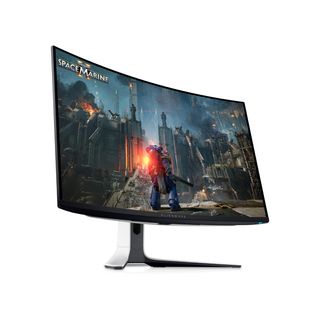
Best overall
The Alienware's 32-inch OLED panel is perfect if you need a high-end monitor that sacrifices little for great color depth and crisp 4K resolution.
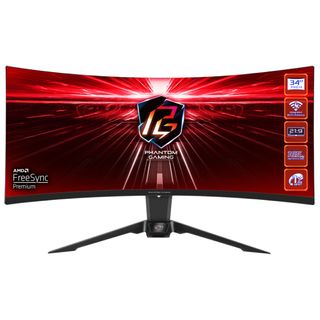
Best budget
The ASRock Phantom Gaming PG34 is an excellent budget gaming monitor that offers a stunning 2K ultrawide panel at a 165Hz refresh rate.
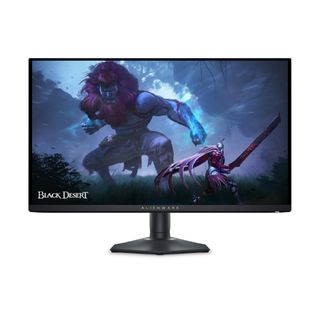
Best 360Hz
The Alienware 27-inch stuns with its colorful OLED are especially valuable for competitive gamers needing a 360Hz panel at 2K resolution panel.
The best gaming monitors in 2024
Why you can trust Laptop Mag
Best overall gaming monitor



Specifications
Reasons to buy
Reasons to avoid
The Alienware 32-inch 4K QD-OLED (AW3225QF) gaming monitor is the best you can buy now. With its 240Hz refresh rate, immersive 1700R curvature, stunning 0.03 millisecond response time, and compatibility with Nvidia G-Sync, you're not going to find a better product if you're willing to dish out $1,199.
Its ports include a USB 3.2 Gen 1 Type-B port, two USB 3.2 Gen 1 Type-A ports, an HDMI 2.1 FRL port with eARC, a regular HDMI 2.1 FRL port, and a DisplayPort 1.4 at the back. At the front of the display, there's also a USB 3.2 Gen 1 Type-A port and a USB 3.2 Gen 1 Type-C port.
It's also important to remember that the monitor does not have built-in speakers. Most gamers will likely use their gaming headset anyway, but if this is a dealbreaker for you, you'll want to look at another gaming monitor.
While our reviewer believed it was a bit dim at 240 nits, it should be bright enough to handle any office space without natural sunlight. Alternatively, you can use its HDR 1000 setting, but we found that this greatly sacrifices the color depth to make the screen brighter, effectively washing out its vibrancy for the sake of up to 1000 nits. As a result, we recommend sticking with SDR for gaming content, but again, this might be a bit dim.
Otherwise, its impressive 128.8% coverage of the DCI-P3 color gamut means it's vibrant enough to satisfy even the most color-hungry individuals. The deep, inky blacks of its OLED panel will turn every scene into something so immersive you'll never want to look away. We have no doubt that most gamers will fall in love with it.
See our full Alienware 32-inch 4K QD-OLED (AW3225QF) review
Best budget gaming monitor



Specifications
Reasons to buy
Reasons to avoid
The ASRock Phantom Gaming PG34 monitor is perfect for individuals who are desperate for an ultra-wide gaming experience but don't want to spend a fortune. With a lovely 3440 x 1440-pixel panel, 165Hz refresh rate, and 1ms response time, it covers the basics well enough for most at just $275.
But how does it do with regard to the nitty gritty? In our lab tests, 90.4 percent of the DCI-P3 color gamut on Standard Mode is phenomenal for such an affordable monitor. When kept at 50 contrast and 70 brightness, we were amazed by how in-depth the image could look while gaming and watching TV. Its biggest flaw is that it seems a bit dim, and even if you push it past our recommended 70 nits of brightness, you're sacrificing the depth of its color, as it will add a layer of green to the image that washes out the display.
While we don't expect many gamers to use built-in speakers, it's good to remember that the PG34's sound is tacked on. It's flat and hollow and should only be used if you have no choice. Its port selection is also a tad limited, which isn't surprising for a monitor at this price, featuring two HDMI 2.0 ports, a DisplayPort 1.4, and an audio jack.
If you're not in a room that is too bright and can handle a slightly dim display, we highly recommend the ASRock Phantom Gaming PG34 for anyone needing a high-quality ultrawide display that doesn't break the bank. It's gorgeous, affordable, and higher quality than other budget alternatives.
See our full ASRock Phantom Gaming PG34 review
Best 360Hz gaming monitor



Specifications
Reasons to buy
Reasons to avoid
If you're looking for a powerful OLED gaming monitor with a phenomenally high refresh rate, we recommend checking out the Alienware 27-inch 2K QD-OLED (AW2725DF). You won't be disappointed by its 2560 x 1440-pixel resolution, Quantum Dot OLED panel, 360Hz refresh rate, 1ms response time, and AMD FreeSync Premium Pro compatibility.
These specs make it ideal for competitive gamers who need the highest refresh rates for intense shooters and strategy titles. However, it's important to remember that you'll need the hardware to match 360Hz. If your rig isn't powerful enough to hit high framerates, you would have wasted your money on a refresh rate this high.
That can also depend on the game, as it's far easier to reach framerates to compliment this refresh rate at lower resolution in titles like DotA or Valorant. In contrast, you might have trouble demanding single-player games like Cyberpunk 2077. This is why you probably won't be able to fully use the 360Hz panel if you exclusively enjoy AAA titles.
Its port selection includes two DisplayPort 1.4 slots for up to 360Hz refresh rate, an HDMI 2.1 port for up to 144Hz refresh rate, a USB 3.2 Gen 1 Type B, and two USB 3.2 Gen 1 Type-A ports. A USB 3.2 Gen 1 Type-C port and another USB 3.2 Gen 1 Type A are on the bottom. Those in need of a diverse port collection won't be disappointed.
It also comes with a stunning color profile, covering 130.6% of the DCI-P3 color range on standard mode, featuring stunning blacks that suck you right in. And while its 242 nits on standard mode might put some off, it's a pretty good number if you plan on playing in a dim room that isn't destroyed by sunlight.
See our full Alienware 27-inch 2K QD-OLED (AW2725DF) review
How to choose the best gaming monitor for you
When shopping for a gaming monitor, there are things you must consider beyond just hardware, as what your rig is capable of will inform your options:
Size: How to find the right size for you.
27 to 32 inches will satisfy most gamers, but you can always go larger if you want something truly spectacular. Otherwise, gaming monitors can range from 24 inches to massive 55-inch monstrosities that could be mistaken for a TV. Determining which size is right for you depends on how much space you have. Most desks accommodate something as large as 55 inches, but we highly recommend measuring your desk to discern what you can and cannot fit.
If you want multiple monitors (I currently have three on my desk), you'll need to be conscious of how they sit side by side and what your viewing angle will look like. It's important to keep in mind that if a monitor is 27 inches, that's its diagonal measurement. You'll need to check to see its exact horizontal measurements (and base measurements) to ensure it can fit on your desk.
Refresh rate: 120Hz should be your minimum
Gaming monitors can feature refresh rates anywhere from 60Hz to 500Hz, but every gamer should at least strive for a 120Hz panel. From there, the power you can output should play a significant part in making this decision, as you won't be able to enjoy a 360Hz refresh rate with weaker specs.
While 120Hz should be your floor, safe bets for most gamers lie anywhere from 165Hz to 240Hz refresh rate. Both of these fast panel speeds will make most of the games you play smooth. If you're into competitive gaming and need something that can accommodate absurdly high frame rates, consider at least 360Hz.
Resolution: 2K is great for most
If you have a budget gaming rig (RTX 3050/3060/4050), you probably won't need much more than 1080p, and it'll mean you can achieve higher framerates in the games you play. If you have a capable gaming rig (RTX 3070/4060/4070), 2K should be more than acceptable for most titles, but you will have to take a hit performance for a crisper image. If you have a high-end gaming rig (RTX 3080/3090/4080/4090), you can consider 4K resolution, but it will still tank performance in the biggest AAA games.
We recommend sticking with 2K unless you're sporting a budget build if you're unsure which one is right. If so, 1080p is fine.
Budget: Fantastic affordable options exist
Gaming monitors might scare you when they soar above $1,000, but only a select few will have any reason to spend that much money. You can pay less for something high quality. If you're looking for a solid budget monitor, you can get a great ultra-wide at 2K resolution for less than $300, and plenty of trusted brands sell products at this price.
If price matters less to you and you're willing to invest in the best of the best, expect to pay over $1,000. These monitors can have as high as a 360Hz refresh rate, 4K resolution, and a stunning OLED panel; they are larger than life. Since monitors complement a gaming rig, your budget should be decided by what you can run. There's no need to spend that much money on 360Hz and 4K if you can't even run games at framerates or resolutions that high.
If you want great, affordable options, check out our best cheap gaming monitor deals, best gaming deals, and best computer monitor deals pages to score a good gaming monitor for a low price.
How we test the best gaming monitors
We put each gaming monitor through our standard benchmark testing by using a Klein K10 colorimeter to detect the brightness, sRGB, and DCI-P3 color gamut of its display. Then, we evaluate each aspect of the gaming monitor, including its ports, performance, design, and speakers.
Regarding the display, we typically play around three games of varying genres to get a feel of what each kind of game looks like on the display. We’ll also watch a movie trailer to see how watching live-action stuff is presented on-screen. We go through the modes and settings during our testing to determine which is best for each viewing experience.
Not every display is going to be super gorgeous and colorful, so we consider the price of the gaming monitor before we determine our scores and impressions.
Stay in the know with Laptop Mag
Get our in-depth reviews, helpful tips, great deals, and the biggest news stories delivered to your inbox.

Self-described art critic and unabashedly pretentious, Claire finds joy in impassioned ramblings about her closeness to video games. She has a bachelor’s degree in Journalism & Media Studies from Brooklyn College and five years of experience in entertainment journalism. Claire is a stalwart defender of the importance found in subjectivity and spends most days overwhelmed with excitement for the past, present and future of gaming. When she isn't writing or playing Dark Souls, she can be found eating chicken fettuccine alfredo and watching anime.
- Rami TabariEditor
- Mark Anthony RamirezFormer staff writer
